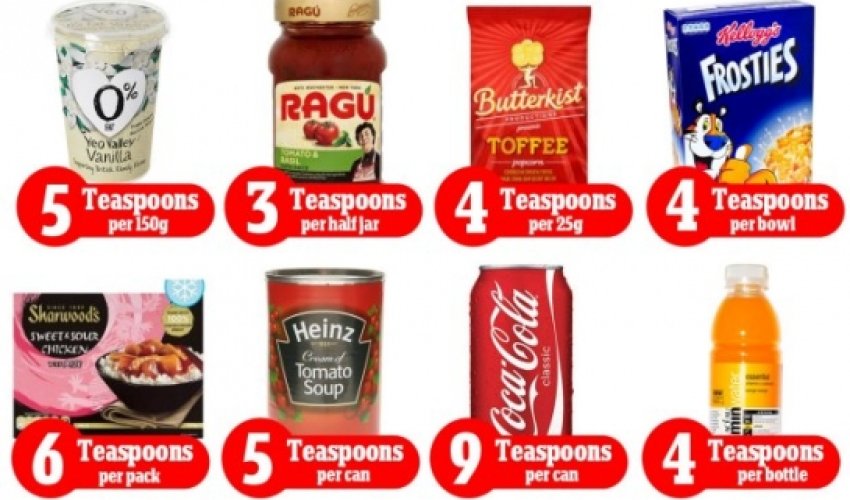How much hidden sugar is in YOUR diet?

A leading professor has spoken out about the dangers of 'hidden sugar' in food.He also cautions against opting for low fat foods that are often full of sugar instead to give them flavour. Graham MacGregor, Professor of Cardiovascular Medicine at the Wolfson Institute of Preventive Medicine at Barts and The London Hospital, says the food industry is adding more and more sugar to food, which consumers are largely unaware of, as it is mostly hidden.Writing for The Conversation, he said: 'Added sugar in our diet is a very recent phenomenon and only occurred when sugar, obtained from sugar cane, beet and corn, became very cheap to produce. 'It’s a completely unnecessary part of our calorie intake: it has no nutritional value, gives no feeling of fullness and is acknowledged to be a major factor in causing obesity and diabetes both in the UK and worldwide.'Professor MacGregor has compiled a table of some of the most common culprits. He says: 'While it may not be surprising that a can of Coca Cola has a staggering nine teaspoons of sugar (35g), similar amounts can be found in the most unlikely of foods.'These include flavoured water, yogurts, canned soup, ready meals and even bread.As Professor MacGregor expains: 'You might opt for 0 per cent fat in your yoghurt, but what if it also comes with five teaspoons of sugar? A bowl of Frosties with semi-skimmed milk only has four.'At the other end of his scale, a Starbucks caramel Frappuccino with whipped cream - made with skimmed milk - contains 11 teaspoons of sugar. A can of regular Coke has nine, a Mars bar eight. When it comes to food, a Sharwood's Sweet and Sour Chicken with Rice contains six teaspoons - two more than a 25g bag of Butterkist toffee popcorn. 'It’s clear this sugar plays a part in soaring levels of obesity and diabetes. To this end, leading health experts from across the globe have united to tackle – and to unmask hidden sugar so consumers can make informed decisions about what they eat and drink.'He adds that sugar in our diets should now be gradually reduced, just as salt has been over the past few years. 'Salt content in food products in the supermarkets have now been reduced by 20-40 per cent and as a result, salt intake has fallen in the UK by 15 per cent (between 2001-2011), the lowest known figure of any developed country.'This this will have reduced stroke and heart attack deaths by a minimum of 9,000 per year, with a saving in health care costs of at least £1.5bn a year, according to the National Institute for Health and Care Excellence (NICE).Professor MacGregor says that a similar move could be taken with sugar.'Like salt, most of the sugar we consume is hidden in processed food and soft drinks. 'There are also specific taste receptors for sugar, which if sugar intake is gradually reduced, become more sensitive. So over time we don’t notice that sugar levels have gone down.'If we can persuade the Department of Health that this programme is very likely to help considerably with the obesity epidemic - and in particular to reduce childhood obesity - while also reducing the incidence of dental disease, and (very likely) the number of people developing Type 2 diabetes, it should have a good chance of success. '(dailymail.co.uk)ANN.Az
Latest news 
More news 



































 Photo
Photo 



 Video
Video 

